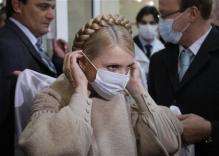In Europe, most swine flu shots by invitation only

(AP) -- In Britain, there are no long lines of people seeking swine flu vaccine. Doctor's offices aren't swamped with desperate calls. And there are no cries of injustice that the vaccine is going to wealthy corporations or healthy people who don't really need it.
Here, and across most of Europe, vaccine to protect against the pandemic flu is mostly given by invitation only to those at highest risk for flu complications.
"That is one of the great advantages of the British health system," said Dr. Steve Field, president of the Royal College of General Physicians. "We have a list of all the names of patients who qualify to be vaccinated."
When Britain unrolled its pandemic vaccination program last month, it designed its campaign to ensure that priority groups - including pregnant women, health workers and those with chronic health problems like diabetes, cancer and AIDS - get the shots first.
Instead of advertising that vaccine had arrived and waiting for the lines to form, Britain's National Health Service sent letters, inviting all those who qualify to make an appointment and get the shots first.
Field said Britain's socialized health care system allows the country to target people who need to be vaccinated quickly: "It's not like the U.S., where it's the survival of the fittest and the richest."
Just this week, Americans learned that Wall Street giants Goldman Sachs and Citigroup got swine flu vaccine, even as many doctor's offices and community clinics still had none. The companies obtained the vaccine through standard procedures, and it was targeted to employees who met criteria for vaccination. But the perception of unfairness set off an outcry.
In the United Kingdom, the general population will be offered the shot after priority groups have been taken care of, probably in about two months. For now, only children with health problems are a priority; healthy children are not.
Similar programs are being carried out in other European countries, all of which have socialized medicine:
- In Germany, doctors have also been contacting high-priority patients to come in for their swine flu shot, though other people who have asked for one have not been turned away.
- In Sweden, Denmark and Finland, some local governments are sending invitations to people in high-risk groups or posting information about vaccine availability on their Web sites.
- So far, France is only vaccinating health care workers. Its health minister said 6 million people in priority groups would start getting invitations to be vaccinated next week.
In North America, swine flu vaccination has largely been a free-for-all, although some U.S. states have recently beefed up their screening process to ensure pregnant women, children and people with health problems get shots before healthy older people.
In Canada, which has a form of socialized medicine, health officials began an investigation this week after professional hockey and basketball players got the vaccine ahead of thousands of children.
Another trend has also affected the trans-Atlantic vaccination picture: While Americans and Canadians appear to be clamoring for the vaccine, many Europeans appear indifferent.
Verona Hall, a London-based midwife, said that among her dozens of pregnant patients none has accepted the invitation to take the shot. The reluctance among pregnant women stems in part from fears the vaccine could hurt their babies, but other priority groups have also shown little interest in the flu shot.
Hall herself recently received a text message asking her to book an appointment to get the vaccine. She declined. "It just doesn't seem that serious here," she said. "Maybe if there are a lot more cases, more people will consider having it. But right now it isn't a priority."
British officials estimate there have been more than 600,000 swine flu cases since the virus was identified in April. In the U.S., experts say there have been millions.
In the U.S., the federal government is paying for the vaccine and rationing supplies to each state. Then state and local health departments decide where it goes next - from schools to doctor's offices to community health clinics and even some large companies with health directors.
On Thursday, the director of the federal Centers for Disease Control and Prevention wrote to local health departments, asking them to ensure the vaccine is getting to high-risk groups first. Dr. Thomas Frieden warned that decisions that appear to send vaccine beyond high-priority groups "have the potential to undermine the credibility of the program."
Lenny Marcus, a public health expert at Harvard University, said the anxiety among Americans about vaccine shortages may have a snowball effect.
Early on, U.S. officials predicted there would be 120 million vaccine doses available by October. They later slashed that estimate, and as of this week there were only about 36 million doses in the country.
"When people believe there's a shortage, that increases demand," Marcus said. "The images of people lining up for hours to get the vaccine, which is in short supply, has a big impact. ... Parents with kids may suddenly be desperate to get them immunized."
In contrast, there are no pictures in the British tabloids of crowded clinics. And the Department of Health won't reveal how many doses are available, saying only that enough vaccine to cover the entire population - 60 million people - had been ordered.
For now, the biggest problem confronting Britain's vaccination effort is not a shortage or public demand. In recent weeks, postal strikes have delayed delivery of about 35 million letters. Health officials worry that high-risk patients waiting for their swine flu vaccine invitation letters might never get them.
"The timing isn't great," said Field, adding doctors would also be telephoning or sending patients text messages if they qualified to get a swine flu vaccine. "So far we have not had a lot of terribly anxious people here."
©2009 The Associated Press. All rights reserved. This material may not be published, broadcast, rewritten or redistributed.
















